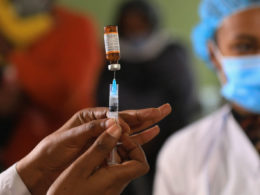Some Zimbabweans have been asking if it is safe to mix Covid-19 vaccines after Zimbabwean authorities announced that those who had received their first jab of the Indian Covaxin but failed to receive the second dose could be vaccinated again using other available vaccines.
The government said they could restart the vaccination exercise using the available Chinese made Sinovac or Sinopharm Covid-19 vaccines.
This comes after the Zimbabwean government failed to acquire second doses of the Indian Covaxin vaccine, citing logistical problems witnessed at the height of the Covid-19 third wave that hit India in May and June this year.
Initially, Zimbabwe had received more than 35 000 doses of the Covaxin vaccine in March through a donation from the Indian government.
Deputy Minister of Health and Child Care, Dr John Mangwiro, recently said those who were affected by Covaxin shortages could restart the vaccination exercise using either Sinopharm or Sinovac.
“Those who failed to get the second Covaxin dose should go to their nearest clinics and get inoculated. They can either get Sinopharm or Sinovac. It’s known that we follow science. There is no danger to their lives. They can also opt to restart the process and receive both the first and second doses of either Sinovac or Sinopharm vaccines,” Dr Mangwiro said.
But people have asked whether mixing vaccines was a safe alternative.
Scientists in the United States (US) and Europe, have said a combination of different authorised vaccines may sometimes work better than two identical doses, as switching between two vaccines stimulates the immune system in different ways.
Researchers even pointed out that studies of experimental HIV vaccines suggested that mixing vaccines could create a broader, more potent response than multiple doses of a single vaccine.
In the US, it is expected that authorisation from the Food and Drug Administration to allow Americans to switch vaccines will be made likely this week, which would be the latest development in what has been termed a long-running debate over whether a mix and match strategy can help protect people against Covid-19.
In Europe, young people who had received one dose of AstraZeneca were offered a second dose of Pfizer after a risk of blood clots, though classified as small, was noted.
The two vaccines – AstraZeneca and Pfizer – were said to be profoundly different, but when researchers looked at the immune response from this mix-and-match approach, they found that it produced more antibodies than two shots of AstraZeneca alone.
The US’s National Institutes of Health in June reportedly started its own variation on the experiment in Europe, looking at what happens when fully vaccinated people switch to a new vaccine for a booster.
It was reported that researchers recruited people and compared nine groups of 50 volunteers each, who had received one of the three vaccines authorised in the US and then gave them one of the three vaccines as a booster.
The scientists, whose first results of trials were presented by Dr. Kirsten Lyke of the University of Maryland School of Medicine, found that switching boosters raised the level of coronavirus antibodies, no matter which combination people received while switching to a new booster did not produce any notable side effects.









